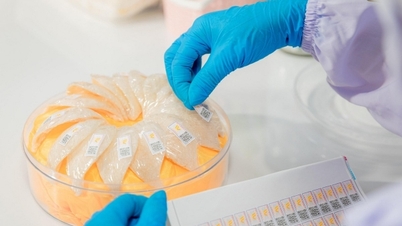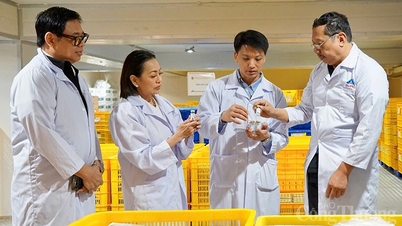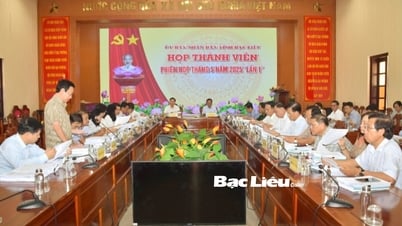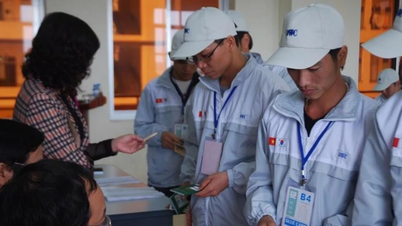
On the morning of August 14, the Ministry of Agriculture and Rural Development held a "Conference to promote sustainable pig farming development" to improve production capacity, raise high-quality livestock, ensure food safety and contribute to stabilizing the market in the last months of the year.
Speaking at the conference, Deputy Minister of Agriculture and Rural Development Phung Duc Tien emphasized that Vietnam's pig farming is identified as a key and important industry that has been gradually shifting from small-scale farming to concentrated, commodity-based, large-scale farming.
There are more and more models of concentrated farming and forming livestock value chains. Currently, the price of pork is quite high, bringing profits to farmers and businesses after a period of losses. In the food basket, pork accounts for 65% of the CPI.
Therefore, the livestock industry requires both ensuring growth, food supply, and ensuring that livestock farmers make a profit, but we also need to have drastic and timely solutions soon so that the CPI index increases at a reasonable level, harmonizing the interests of livestock farmers and consumers, contributing to improving people's lives.
Mr. Le Thanh Hoa - Deputy Director of the Department of Quality, Processing and Market Development said that the current supply is showing a decreasing trend due to the widespread African swine fever epidemic but still ensures to meet domestic consumption demand.
Mr. Hoa forecasts that from now until the end of 2024, food prices in general and pork in particular will tend to stabilize due to abundant supply and stable demand thanks to maintained domestic raw material prices.
According to Mr. Pham Kim Dang - Deputy Director of the Department of Animal Husbandry, Ministry of Agriculture and Rural Development, in the first 6 months of 2024, the epidemic was basically controlled, imports were tightened, anti-smuggling was strengthened, exports were promoted, livestock product prices increased above production costs to attract herd restoration, so the total pig herd still maintained a good growth rate.
Currently, the total number of pigs in the country is about 25.5 million, an increase of about 2.9% over the same period in 2023.
In 2023, pig farming will develop stably in the context of household farming shifting strongly to semi-industrial farming, linking with businesses, chain farming, biosafety, disease safety and application of advanced technology increasingly increasing and promoting.
These efforts and results have helped transform Vietnam's livestock industry from a fragmented, small-scale, self-sufficient one in the past into a country with the world's 5th largest pig farming industry in terms of head and 6th in terms of output.
According to Mr. Dang, the livestock industry worldwide has been experiencing many fluctuations and is forecast to continue to develop in 2024 and the following years. There are new trends in pig farming and some of these trends are and will affect Vietnam's approach.
In particular, given the complicated developments of some dangerous infectious diseases such as acute diarrhea, blue ear disease or African swine fever that have caused great damage to the pig farming industry, the application of biosafety farming is an urgent requirement for livestock farming in general and pig farming in particular.
Therefore, biosecurity farming is not only applied to pig farms but also applied to all stages of the chain such as input materials, feed, breeds, slaughter, processing, preservation and distribution.
However, according to Mr. Dang, in Vietnam, biosafety farming and disease control have not been implemented synchronously. African swine fever, foot-and-mouth disease, etc. always pose a risk of re-emergence, and biosafety farming has not been really paid attention to by farm owners to implement before, during and after the farming process, especially in the household farming area and small and medium-sized farms.
In addition, the inevitable solution also mentioned by the Deputy Director of the Department of Animal Husbandry is to apply precise technology; use multi-storey houses; organic farming; reduce emissions, farming according to the circular economic model; not using antibiotics; and being humane to livestock.
At the conference, Mr. Dang hoped that in the coming time, action plans at all levels will be promoted to promptly implement the contents and norms of support policies to improve livestock efficiency, stabilize the total herd, promote the production of animal feed ingredients, and promote linkages.
Mr. Phan Quang Minh - Deputy Director of the Department of Animal Health shared that up to now, the whole country has 306 outbreaks of African swine fever in 100 districts of 29 provinces and cities that have not passed 21 days. The number of pigs infected with the disease is 34,304, the number of pigs that died and were destroyed is 34,416.
One limitation that Mr. Minh pointed out is that the situation of people selling sick pigs or pigs suspected of being sick still exists, and the management of slaughtering and transporting pigs in epidemic areas has not been carried out according to regulations.
Source


![[Photo] Prime Minister Pham Minh Chinh chairs meeting on science and technology development](https://vphoto.vietnam.vn/thumb/1200x675/vietnam/resource/IMAGE/2025/5/17/ae80dd74c384439789b12013c738a045)

![[Photo] More than 17,000 candidates participate in the 2025 SPT Competency Assessment Test of Hanoi National University of Education](https://vphoto.vietnam.vn/thumb/1200x675/vietnam/resource/IMAGE/2025/5/17/e538d9a1636c407cbb211b314e6303fd)
![[Photo] Readers line up to visit the photo exhibition and receive a special publication commemorating the 135th birthday of President Ho Chi Minh at Nhan Dan Newspaper](https://vphoto.vietnam.vn/thumb/1200x675/vietnam/resource/IMAGE/2025/5/17/85b3197fc6bd43e6a9ee4db15101005b)


























![[Photo] Nearly 3,000 students moved by stories about soldiers](https://vphoto.vietnam.vn/thumb/1200x675/vietnam/resource/IMAGE/2025/5/17/21da57c8241e42438b423eaa37215e0e)





































































Comment (0)